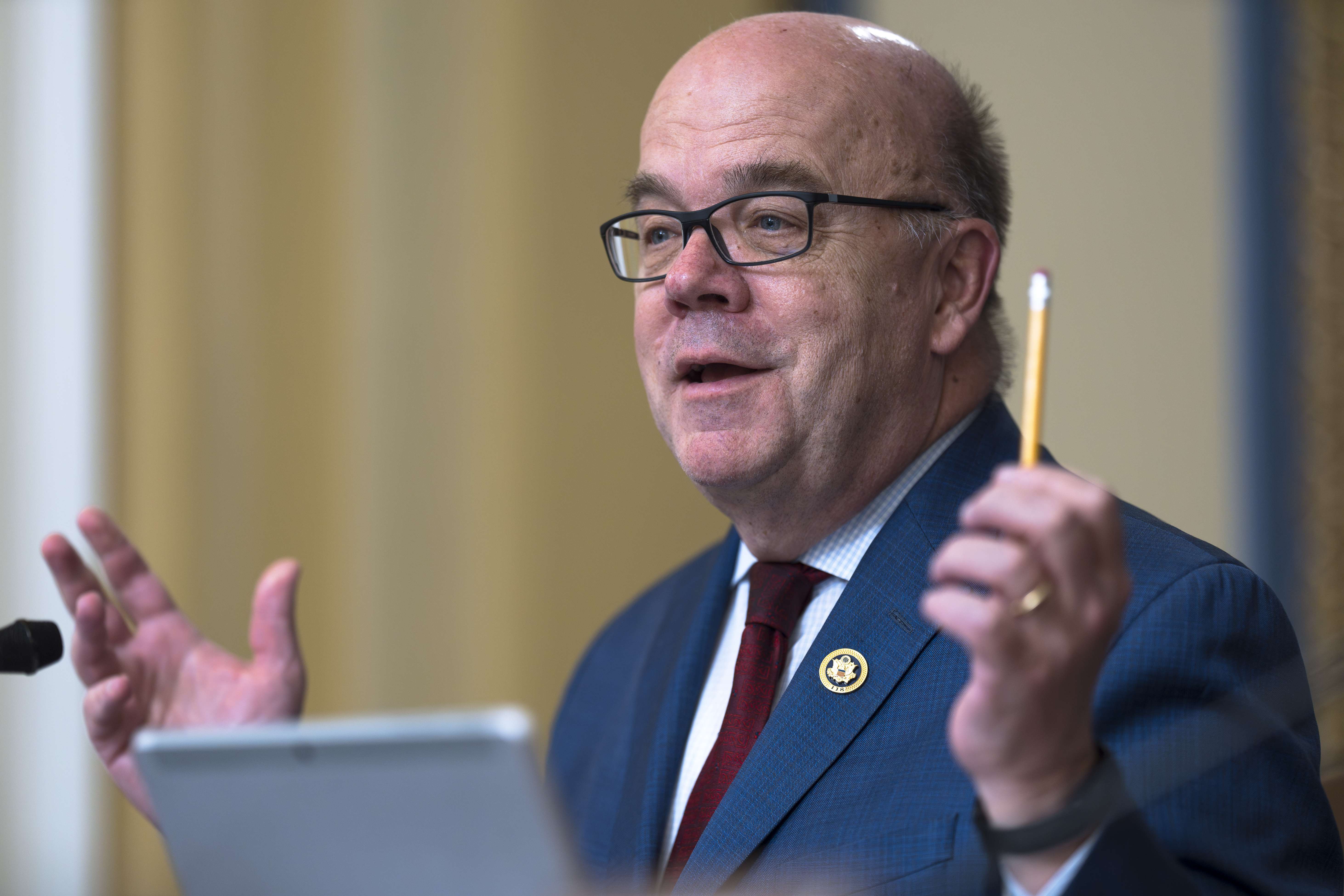Over the course of decades, House lawmakers had succeeded only a few times in triggering votes on bills the chamber’s leaders refused to call up.
Then Mike Johnson became speaker.
On the Louisiana Republican’s watch, the “discharge petition” has caught fire. Rank-and-file lawmakers have managed five times since he won his gavel two years ago to circumvent Johnson’s wishes by getting the 218 signatures needed to force votes on legislation he had blocked — more than in the prior 30 years combined.
Most recently, a bipartisan group used the maneuver to advance a long-stalled bill requiring President Donald Trump’s administration to release information about the late convicted sex offender Jeffrey Epstein.
It’s members of Johnson’s own party who have most effectively wielded the tool in recent years. Rep. Thomas Massie (R-Ky.) masterminded the Epstein push, while Rep. Anna Paulina Luna (R-Fla.) engineered an effort to seek voting accommodations for House members with newborn babies. Before that, then-Rep. Garret Graves (R-La.) used the gambit to enact a bill to expand Social Security payments for millions of public sector workers.
“They try to say that discharge petitions are a tool of the minority, but that’s actually only the perspective of people that want to consolidate power within leadership,” Luna said in an interview, adding that she would protect the maneuver “with every bone in my body.”
The upshot for Johnson is that the arcane legislative mechanism once known only to Capitol Hill obsessives is now a routine part of life in the Republican House majority. Beyond Epstein, Johnson is now facing several new drumbeats for action, with lawmakers looking to force votes on banning member stock trading, sanctioning Russia and extending health care subsidies that are set to expire at year’s end.
The GOP’s slim majority is an obvious contributor to the burgeoning popularity of the maneuver. The discharge process is set into motion when 218 members sign on to a petition, meaning only a handful of Republicans need to cross leadership if Democrats are united in support.
But the recent spate of successful discharges also reflects careful groundwork Democrats laid to quickly seize on the procedure, along with a sentiment among many Republicans that Johnson is stifling the will of the House to appease Trump and small GOP factions — including hard-liners who successfully ousted Johnson’s predecessor, Kevin McCarthy.
“I would encourage you to ask Mike Johnson why he repeatedly refused to bring my bill to the floor,” Rep. Greg Steube (R-Fla.) said in an interview.
‘Toxic political environment’
Steube is still bitter about how Johnson hindered passage last year of his legislation to provide tax relief to disaster survivors, even after the measure was unanimously approved in committee. Once Steube got the signatures he needed to compel floor action, the measure passed the House in a 382-7 vote before clearing the Senate and earning then-President Joe Biden’s signature.
That first victory — seven months into Johnson’s tenure as speaker — showed how the maneuver can be successful “in a toxic political environment,” said Steube, a MAGA-hat-wearing, fourth-term member who has consistently won his southwest Florida district by a landslide. “It’s got to be something that is very bipartisan and is important enough that the body says, Yeah, this warrants overriding the speaker.”

The discharge petition dates back to 1910, when it was created in response to the “overreaching, overbearing, overcontrolling” style of then-Speaker Joseph Cannon — aka “Czar Cannon” — according to Sarah Binder, a George Washington University professor who focuses on legislative politics.
Now, she said, it serves as a “pressure valve” for a chamber designed to reflect the majority’s will.
In some cases, discharge petitions can help solve thorny political problems for the speaker. Philip Wallach, who studies the roots of congressional dysfunction at the right-leaning American Enterprise Institute, said Johnson is “using this idea of getting forced” as a way to keep his job.
“He’s actually kind of deft at the coalition management problem and at staying on side with Trump,” Wallach said. “If he acted some other way, I really do think there’s a good chance that he would find himself on the wrong side of Trump and get thrown out.”
That was certainly the case with the Epstein vote, though Johnson protested mightily against the bill Massie and his ally Rep. Ro Khanna (D-Calif.) sought to discharge, arguing until the moment Trump signed it that it did not do enough to protect Epstein’s victims from invasions of privacy.
But as the 427-1 vote demonstrated, there was a deep groundswell for transparency that Johnson had been holding off at Trump’s behest.
‘The fuse in the fuse box’
Massie said members of both parties are now “brainstorming” other bills they might be able to catapult to the floor.
“It’s the fuse in the fuse box when everything gets jammed up and the wires get crossed and nothing can get done,” he told reporters last week.
In discouraging Republicans from signing on to discharge petitions, House GOP leaders argue that the tactic undermines the party in power and circumvents Congress’ “regular order” system of debate, where legislation is meant to advance through committees with special expertise.
“Typically it’s when somebody either doesn’t want to go through the committee process or doesn’t get what they want out of the committee process,” House Majority Leader Steve Scalise (R-La.) said in an interview.
But it’s not just committee calendars and floor scheduling that has chafed many House Republicans. GOP leaders have taken more overt steps this year to thwart the chamber’s ability to work the majority’s will — including by preemptively blocking efforts to force votes on canceling some of Trump’s tariffs.

Even before Johnson’s tenure, House leaders of both parties have chipped away at the “open rule” practice of allowing lawmakers to debate any amendments they wanted on the floor. Now they nearly always pick and choose the amendments allowed — if they allow them at all.
On the Epstein bill, the House’s top Republicans characterized the decision to sign Massie’s petition as a loyalty test.
“They made it pretty clear that if you get on the discharge petition, you’ve declared war on the president, in so many words,” Rep. Don Bacon (R-Neb.) said in an interview, adding that he sympathized with Johnson’s need to keep Trump and “prima donnas” in the House GOP happy.
“He tries his best,” Bacon said.
But Bacon, who is retiring after his term ends, has signed on to several discharge petitions, including one to sanction Russia and aid Ukraine, which is just a few signatures shy of 218. Bacon reasons that gesture is a way to show Trump that there’s rising support for helping Ukraine while affording Johnson some political cover.
“I feel like I’m helping him out by doing the discharge on Ukraine, in a way,” Bacon said of Johnson. “Because I’m trying to force the hand. He’s going to say, ‘I didn’t have any choice on this.’”
‘Zombie’ legislation
Democrats, to be sure, have done their share to contribute to the dizzying pace of discharges. Just last week, another petition succeeded, setting up a vote on a measure sponsored by Rep. Jared Golden (D-Maine) that would nullify an executive order Trump issued in March scrapping the collective bargaining rights of more than 1 million federal employees.
The party’s leaders, in fact, have quietly plotted for months to take full advantage of the tool. Under House rules, it typically takes well over a month to force a vote once a petition gets the requisite 218 signatures. So Massachusetts Rep. Jim McGovern, the top Democrat on the House Rules Committee, coordinated the filing of “zombie” measures containing placeholder language allowing members to jump-start the procedural countdown before they finalize the substance of the legislation they want to propel to the floor.

McGovern acknowledged in an interview that none of that spade work pays off unless at least a few members of the majority are disgruntled enough to buck their leaders.
“It takes a lot of courage for Republicans to sign on to a discharge petition when they’re in charge,” he said. “But I think it’s a reflection of their frustration with their own leadership.”
Off the Hill, congressional observers who know the history of the seldom-used gambit are stunned, if not necessarily surprised, by its recent success.
“Despite the fact that it doesn’t succeed very often, it’s out there for an ambitious, organized minority — and, in this case, also disgruntled or concerned majority members, who feel their leadership’s not on the right side of the issue,” Binder said. “So beware the discharge.”
Cassandra Dumay contributed to this report.




















